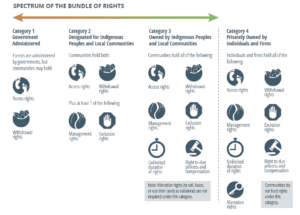Forest and Land Tenure
RRI’s Forest Tenure Database tracks and classifies the forest area of 58 countries covering nearly 92 percent of the world’s forests—including the 30 most forested countries in the world—according to four tenure categories: owned by Indigenous Peoples, Afro-descendant Peoples, and local communities; designated for Indigenous Peoples, Afro-descendant Peoples, and local communities; government administered; and privately owned by individuals and firms.
As of 2017, Indigenous Peoples, Afro-descendant Peoples, and local communities had legally recognized rights to 15.3 percent of the world’s forests, a 40 percent increase from 2002. Over 98 percent of this progress occurred in developing countries: communities now have legal rights to 28 percent of the developing world’s forests in Africa, Asia, and Latin America. Visit RRI’s Tenure Tool to explore RRI’s Forest Tenure Data further.
Government administered
Lands or forests under this category are legally claimed as exclusively belonging to the state. Community-based rights to access and/or withdrawal of natural resources may be recognized. Concessions on state-owned lands are included here.
Designated for Indigenous Peoples, Afro-descendant Peoples, and local communities
National law recognizes Indigenous Peoples’, Afro-descendant Peoples’, and local communities’ rights to access and withdrawal, as well as to participate in the management of lands/forests or to exclude outsiders. Other tenure rights may also be recognized, but the bundle of legally recognized rights held by communities does not amount to “ownership.”
Owned by Indigenous Peoples, Afro-descendant Peoples, and local communities
Lands or forests are owned by Indigenous Peoples, Afro-descendant Peoples, and local communities where their rights of access, withdrawal, management, exclusion, and due process and compensation are legally recognized for an unlimited duration. Alienation rights (whether through sale, lease, or use as collateral) are not required for communities to be classified as land or forest owners under this framework.
Privately owned by individuals and firms
Individuals and firms are considered to privately own land/forestland when they legally hold the full bundle of rights (access, withdrawal, management, exclusion, and due process and compensation) for an unlimited duration, as well as the right to sell their land/forestland.
As a complement to this spatial data, detailed qualitative data on the bundle of forest tenure rights legally held by Indigenous Peoples, Afro-descendant Peoples, and local communities—such as their specific rights to withdraw timber and non-timber forest products for subsistence and commercial purposes—is maintained for 80 community-based tenure regimes recognized within 30 low- and middle-income countries covered by RRI’s Forest Tenure Database.

Land Tenure
To improve global data on the status of Indigenous Peoples’, Afro-descendant Peoples’, and local communities’ land rights, RRI applies the same quantitative methodology to track the area legally owned by and designated for Indigenous Peoples, Afro-descendant Peoples, and local communities across all terrestrial ecosystems in 73 countries covering 85 percent of global land area. As of 2020, Indigenous Peoples, Afro-descendant Peoples, and local communities legally own just over 11 percent of the world’s land, with their more limited designation rights recognized over a further 7 percent of the world’s land. This represents an increase of over 100 million hectares in recognition from 2015-2020. However, a significant gap remains, given that communities customarily hold and use approximately half the world’s land.
We invite readers to send feedback on the accuracy, relevance, and comprehensiveness of the data presented in RRI’s reports and website by contacting Chloe Ginsburg.
